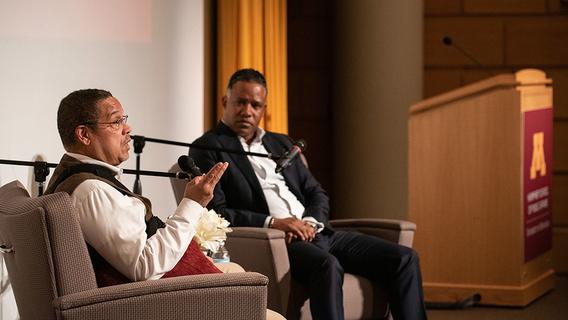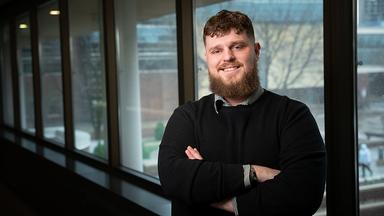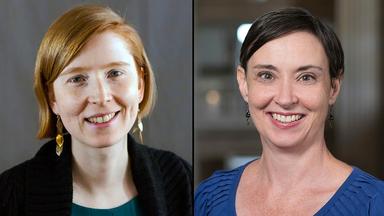
Nearly four years after the death of George Floyd at the hands of Minneapolis police officers, the debate about police reform in Minnesota is still laden with strong emotions. Floyd’s death in May 2020 ignited huge protests around the nation decrying racial inequities in policing and the criminal justice system.
The Humphrey School of Public Affairs hosted a candid and thoughtful discussion of the subject earlier this month featuring Minnesota Attorney General Keith Ellison, whose office successfully prosecuted Derek Chauvin, the police officer held most responsible for Floyd’s death.
Ellison recently wrote a book, Break the Wheel: Ending the Cycle of Police Violence, giving his personal account of the Chauvin case and laying out a template for police reform.
Ellison was joined by Kenneth Polite, former head of the U.S. Department of Justice (DOJ) criminal division and a proponent of community-based crime prevention. Their conversation touched on several key aspects of the Chauvin case and the need for reforms to the criminal justice system.
Here are some key takeaways.
The Humphrey School’s role in hosting this conversation
Dean Nisha Botchwey welcomed the audience, saying the event underscores the importance of the Humphrey School as “a hub for policy dialogue and action. In the aftermath of the tragic murder of George Floyd and the ensuing national reckoning on racial justice, it is imperative that we confront the systemic issues that perpetuate police violence and institutionalized racism. As a policy school, we have a unique opportunity to bring together diverse perspectives, expertise, and lived experiences to inform policy solutions that address these urgent challenges.”
Associate Professor Kathy Quick also made opening remarks, informed by her experience working with activists, police officers, elected officials, and other community members on issues of public safety and policing.
“It’s fair to say there is hardly a public issue more complex and divisive than public safety. You may have strong opinions about what we should do about public safety. … However, we cannot actually find innovative, actionable, impactful solutions without deeply understanding the nature of the problem. And we gain those insights by listening, carefully” to the experiences of others, and by being open to taking action based on those experiences.
The prosecution of Derek Chauvin
Keith Ellison praised the team of attorneys who worked on the Chauvin case, including some who were brought in as special prosecutors. He also recognized the support received from then-Hennepin County Attorney Mike Freeman, the U.S. attorney for Minnesota, and the U.S. Justice Department.
Ellison said in preparing for the trial, he took lessons from the handling of the Freddie Gray case in Baltimore. Gray died in police custody in 2015, several days after he had been arrested, handcuffed, and driven around, unsecured, in the back of a police van. Six police officers were charged but none convicted in Gray’s death, because the evidence did not show exactly when and where he suffered the severe neck injury that ultimately proved fatal.
“It all revolved around whether Gray was hurt before he got into the police van or after, which created reasonable doubt, and that amounted to acquittals,” Ellison said. “So when it came to building the medical case in George Floyd’s death, the link needed to be very tight. So we put a lot of energy, time, and resources into the medical case.
“I think that greater care should be put into cases involving police misconduct, not because I think that police officers deserve more punishment than others—I actually don’t. But the legitimacy of our system depends upon people believing there’s equal justice under the law. If they don’t believe that, it’ll undermine people’s respect for the system, and the system won’t be able to function properly.”
Victim-centered approach to criminal justice
Kenneth Polite: “Broadly, the criminal justice system needs to bring more of a victim-centered focus to its activities. I’ve had cases where defendants have been given life sentences, and the victim’s family still feels like it’s not enough. It is one of the clear limitations of the criminal justice system.”
Ellison: “The system doesn’t really have many consequences for defendants beyond restitution, fines, and jail. We should have other options that address what victims and their families need.
“Victims of crime respond in a variety of ways. Some are forgiving, some want revenge, some just want an apology. George Floyd’s family never wanted revenge. I think if we lift up victims more, then we will get a more just system, and that’s where restorative justice can play a role.”
Restorative justice focuses on the rehabilitation of offenders through reconciliation with victims and the community at large. It focuses on those who have been harmed, and the harms they have experienced. In the restorative justice process, victims are empowered to participate more fully than in the traditional criminal justice system.
Ongoing community trauma
Ellison: “Our community is still traumatized from George Floyd’s murder, so much so that it’s extremely difficult to objectively evaluate any officer-involved shooting case. No matter the facts, there are people who are going to be certain that the officer did no wrong at all, and other people are going to be certain that the officer did wrong and needs to go to prison forever, and there’s very little space for a more measured response.
“If an individual person commits a crime against you, you call the police. But if an agent of the state, who carries the imprimatur of all of us, commits a crime against you, who are you going to call then? There’s a sense of helplessness. This impacts us, it affects us, and we’ve got to use healing tools, such as restorative justice, to get out of it.”
The role of police
Ellison: “Let me say this on behalf of the police: our society has segregated people by race for decades, and the police are charged with maintaining that social order. But what has everybody else done to address segregation in Minnesota? We’ve got to solve that. I think it’s still the undone work of the civil rights movement from the 1960s.”
Polite: “In the book, you talk about how the prosecution of George Floyd’s killers is about upholding the dignity of police officers; that it’s not an anti-police officer case, it’s a pro-police officer case. For me, the idea of you as a prosecutor wanting to hold [the offenders] accountable makes complete sense. But there are people who struggle with holding both of those ideas at the same time.”
Ellison: “I have friends who have suffered tremendous loss that involved unjust policing. Many of them have extrapolated their horrible experience to the entire system, and feel it’s an irredeemable system. If you believe that, where does that leave us? To say the system is messed up doesn’t solve the problem.
“Crime happens, and you’ve got to have somebody to investigate and respond to those situations, so to say that we don’t need any police is [unrealistic]. The question is, can we do it constitutionally, can we do it in a way that is not racially biased, can we do it in a way that inculcates trust and cooperation from the community?
“Derek Chauvin diminished the esteem of policing in the eyes of the public, and that’s a problem we’ve all got to overcome.”
What is justice?
Associate Professor Brandi Blessett, whose research focuses on race and social justice, closed the program by sharing her perspectives on the conversation and the issues surrounding police reform.
“Too often, people are marginalized by society’s mythical yet powerful hierarchies, and they rarely receive compassion, empathy, or the benefit of the doubt when engaging with police officers. To be Black, Indigenous, an immigrant, a non-English speaker, or LGBTQIA has led to policies that criminalize people just for trying to live full and authentic lives.
“Justice continues to be denied due to a focus on punishment, rather than an appreciation for accountability and one’s humanity. So I ask, what is justice? Is it the conviction of Derek Chauvin? It is accountability, but is it justice? And if it’s justice, then for whom?”
Justice requires a collective commitment to community and accountability; and investments in housing, health care, employment, and education in historically disenfranchised communities, she said.
“When people have their basic needs met, the reliance on police to solve social problems diminishes tremendously.
“The justice that we seek is not out there for someone else to achieve. Instead, it is something that each of us has a responsibility to work toward every single day. So I leave you with a call to action: to define what justice is for you and your community, and to commit to doing one thing within your sphere of influence to move the justice needle forward.”

